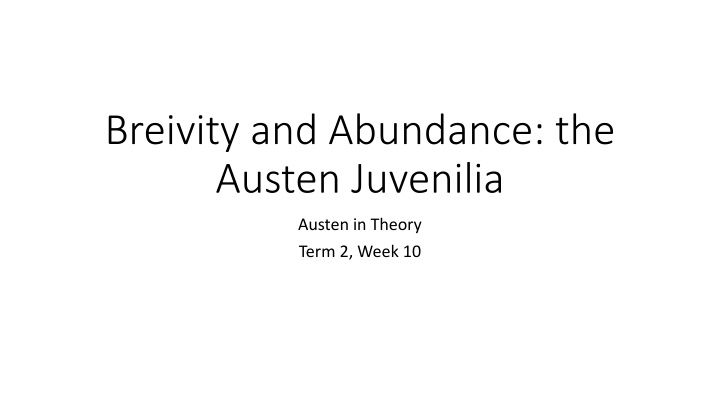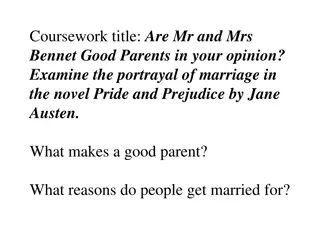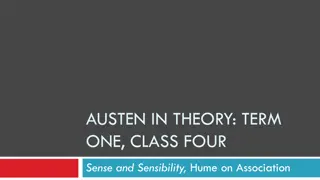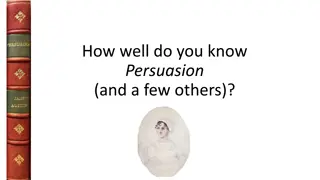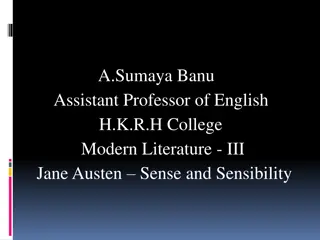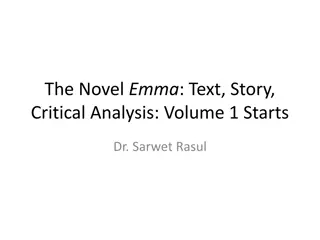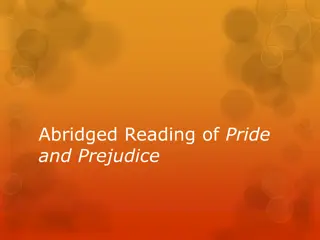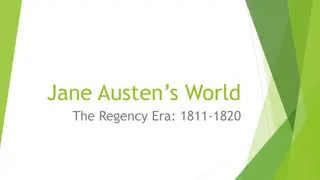Insights into Austen's Juvenilia: Breivity and Abundance
Austen's early works, written before age 18, offer a glimpse into her evolving style and themes. Themes of scarcity, abundance, romance, and societal norms are explored through humorous parodies and exaggerated characters, providing a unique perspective on Austen's later works.
Download Presentation

Please find below an Image/Link to download the presentation.
The content on the website is provided AS IS for your information and personal use only. It may not be sold, licensed, or shared on other websites without obtaining consent from the author.If you encounter any issues during the download, it is possible that the publisher has removed the file from their server.
You are allowed to download the files provided on this website for personal or commercial use, subject to the condition that they are used lawfully. All files are the property of their respective owners.
The content on the website is provided AS IS for your information and personal use only. It may not be sold, licensed, or shared on other websites without obtaining consent from the author.
E N D
Presentation Transcript
Breivity and Abundance: the Austen Juvenilia Austen in Theory Term 2, Week 10
Juvenilia Written before age 18; some we have dates for, some not Austen lives 1775-1817, so some juvenilia is pre-wartime (hostilities with France, War of the First Coalition, begin 1793)
Scarcity and Abundance The Generous Curate is called A moral Tale, setting for the Advantages of being Generous and a Curate The heavy repetitions of didactic fiction, as well as the ludicrous repetitions of romantic stories, find themselves relentlessly parodied: the eldest son in this story finds himself in the navy, where his promising and amiable disposition had procured him many friends among the Natives, and from whence he regularly sent home a large Newfoundland Dog every Month to his family . Elements of what Austen would filter out of the dominant mode of her later fictions appear prominently in these early texts, along with those sad realities of contemporary life she could not entirely do away with. The Memoirs of Mr. Clifford inform us that he was a very rich young Man and kept a great many Carriages of which I do not recollect half. I can only remember that he had a Coach, a Chariot, a Chaise, a Landeau, a Landeaulet, a Phaeton, a Gig, a Whisky, an Italian Chair, a Buggy, a Curricle & a wheelbarrow a preamble to Henry Tilney s obsessive JARGON regarding horses, as well as a wary note about the needless abundance society bestowed on a very rich young man (51). Henry and Eliza, similarly, makes a kingdom of menacingly silly abundance out of the lives of the astonishingly wealthy. The short tale opens with Sir George and Lady Harcourt superintending the Labours of their Haymakers, rewarding the industry of some by smiles of approbation, & punishing the idleness of others by a cudgel, participating directly in a paternalistic reward and physical cruelty only implicit in the major novels (38).
The Romance and the outsider Romance: pre-novelistic form predecessor of the soap opera, in particular its one-thing-after-another-ness The Generous Curate carries on in the one-thing-after-another style of the romance (the main character lived in a continued course of uninterrupted Happiness, till she had attained her eighteenth year, when happening one day to be detected in stealing a banknote of 50 , she was turned out of doors by her inhuman Benefactors ), in which characters are entirely at the whim of incident and, to a surprising extent, numbers. Eliza is pursued by 300 armed Men, remains in France for 3 years, where she became the parent[] of two Boys, and lived on 18,000 a year without saving anything (41). None of these numbered entities are narrated as anything other than numbers; it s as though Eliza is chased about by cells in a spreadsheet. Of course, this is also a distorted, extenuated version of the fate of many of Austen s characters in the adult novels. The Dashwood family is also chased from location to location by a grim progression of numbers. The Sense and Sensibility narrator just presents this from within community consensus that surrounds them, showing in the opening disinheritance scene how economic dispossession becomes naturalised. The youthful parodist writing these texts, again like Catherine Morland, stands just outside of society s rules. The comic effloresences of these texts, their weird flarings-up of cannibalistic children ( she began to find herself rather hungry, & had reason to think, by their biting off two of her fingers, that her Children were much in the same situation ) or meaningless social performances ( She next ascended a Hackney Coach & ordered it to Hampstead, where she was no sooner arrived than she ordered the Coachman to turn round & drive her back again ) give an early vision of a writer noting a core absurdity behind the forms of writing and the society they produced (115, 55).
